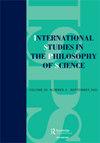Pseudoscience as a Negative Outcome of Scientific Dialogue: A Pragmatic-Naturalistic Approach to the Demarcation Problem
IF 0.8
2区 哲学
Q2 HISTORY & PHILOSOPHY OF SCIENCE
International Studies in the Philosophy of Science
Pub Date : 2021-07-03
DOI:10.1080/02698595.2022.2057777
引用次数: 2
Abstract
ABSTRACT The demarcation between science and pseudoscience is a long-standing problem in philosophy of science. Although philosophers have been hesitant to engage in this project since Larry Laudan announced its demise in the 1980s, pseudoscience as a societal phenomenon did not disappear, and many policy makers and scientists continue to use the concept. Therefore, the philosophical challenge of explaining what pseudoscience is and how it differs from genuine science still stands. Even though it might well be impossible to identify all pseudosciences by means of a set of necessary and sufficient conditions, we can nonetheless, in a naturalistic fashion, establish that pseudoscience is a real phenomenon, diagnose recurring features and symptoms, and explain how these emerge. In this paper we argue that science builds on and emerges from interactive reasoning, a process that, under particular conditions, weeds out beliefs and practices that are not (sufficiently) justified. When people nevertheless think of these beliefs and practices as equivalent to or even better than the ones accepted by the scientific community, they are rightfully regarded as pseudoscience. We explain the processes by which beliefs and practices may degenerate into pseudoscience and discuss the implications of our demarcation approach for the understanding of pseudoscience.伪科学是科学对话的消极结果:对划界问题的实用主义-自然主义方法
科学与伪科学的界限是科学哲学中一个长期存在的问题。尽管自拉里·劳丹在20世纪80年代宣布该项目消亡以来,哲学家们一直在犹豫是否参与该项目,但伪科学作为一种社会现象并没有消失,许多政策制定者和科学家仍在继续使用这一概念。因此,解释什么是伪科学以及它与真正科学的区别的哲学挑战仍然存在。尽管通过一系列必要和充分的条件来识别所有伪科学可能是不可能的,但我们仍然可以以自然主义的方式确定伪科学是一种真实的现象,诊断反复出现的特征和症状,并解释这些特征和症状是如何出现的。在这篇论文中,我们认为科学建立在互动推理的基础上,并从互动推理中产生,在特定条件下,互动推理会剔除不(充分)合理的信念和实践。然而,当人们认为这些信仰和实践等同于甚至优于科学界所接受的信仰和实践时,他们理所当然地被视为伪科学。我们解释了信仰和实践可能退化为伪科学的过程,并讨论了我们的划界方法对理解伪科学的影响。
本文章由计算机程序翻译,如有差异,请以英文原文为准。
求助全文
约1分钟内获得全文
求助全文
来源期刊

International Studies in the Philosophy of Science
HISTORY & PHILOSOPHY OF SCIENCE-
自引率
12.50%
发文量
10
期刊介绍:
International Studies in the Philosophy of Science is a scholarly journal dedicated to publishing original research in philosophy of science and in philosophically informed history and sociology of science. Its scope includes the foundations and methodology of the natural, social, and human sciences, philosophical implications of particular scientific theories, and broader philosophical reflection on science. The editors invite contributions not only from philosophers, historians, and sociologists of science, but also from researchers in the sciences. The journal publishes articles from a wide variety of countries and philosophical traditions.
 求助内容:
求助内容: 应助结果提醒方式:
应助结果提醒方式:


